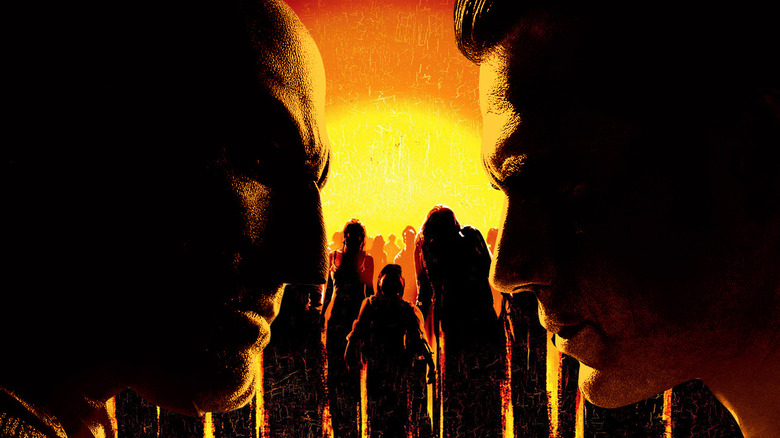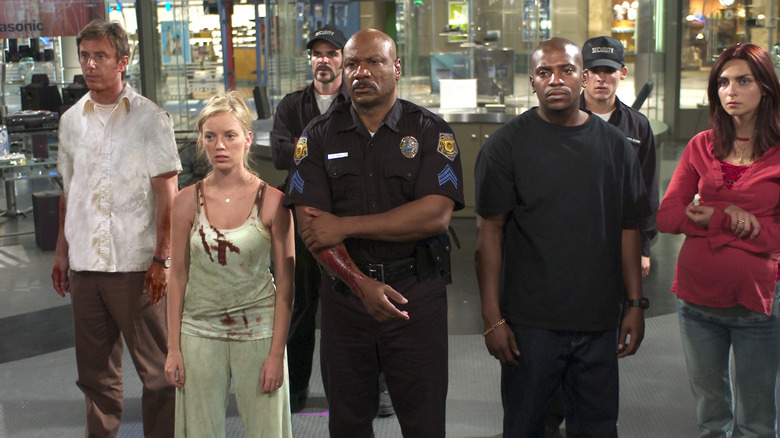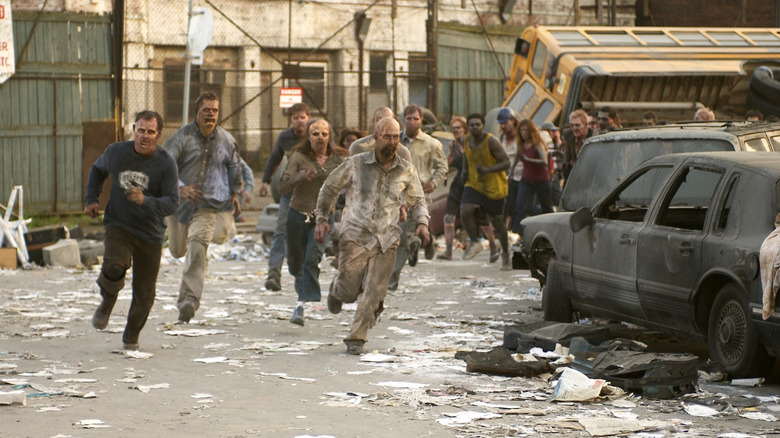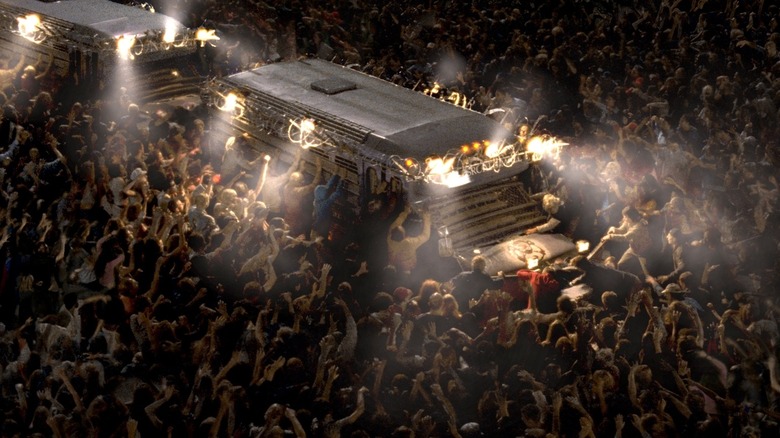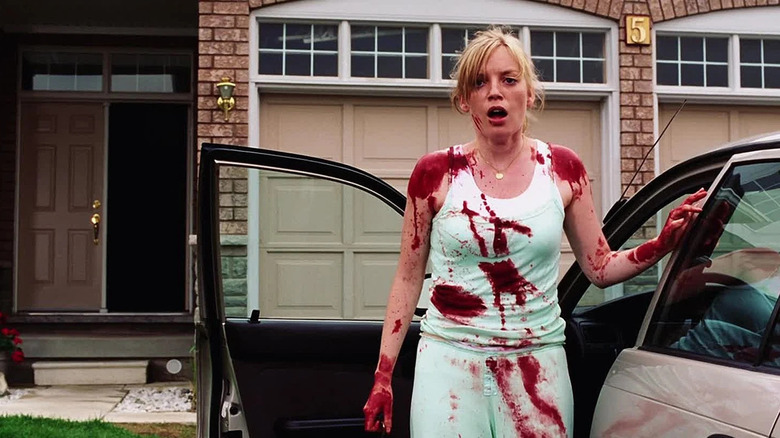Tales From The Box Office: How The Dawn Of The Dead Remake Planted The Seeds For The DC Universe
(Welcome to Tales from the Box Office, our column that examines box office miracles, disasters, and everything in between, as well as what we can learn from them.)
Universal Pictures once had the bright idea to remake one of the all-time horror classics in the form of George A. Romero's "Dawn of the Dead." It is, arguably, one of the greatest genre films ever made, so who would do such a thing? Why remake a perfect movie? More importantly, who would be crazy enough to make it? Well, two then-up-and-coming filmmakers in the form of James Gunn and Zack Snyder paired as writer and director, respectively, to do the seemingly unthinkable. Even more unthinkable? It worked like gangbusters, putting them both on a path to becoming two of the biggest filmmakers in Hollywood.
To that end, Snyder became the man tasked with launching DC's shared cinematic universe, directing "Man of Steel," "Batman v Superman: Dawn of Justice," and the highly-troubled "Justice League." Gunn, meanwhile, turned some unknown heroes into one of Marvel's biggest franchises in the form of "Guardians of the Galaxy" and directed one of DC's most acclaimed movies with "The Suicide Squad." Now? He's the co-chairman and co-CEO of DC Studios alongside producer Peter Safran, and will be steering the house that Batman built for at least the next four years.
That being the case, the DC universe as we know it kind of, interestingly enough, starts with a mid-budget, R-rated, studio-produced remake of a classic horror movie. In honor of Gunn's recent appointment as the co-head of DC Studios, we're looking back at "Dawn of the Dead," how Gunn and Snyder approached the tall task, how it dethroned one of the biggest R-rated movies in history, and what lessons can be learned from it nearly 20 years later. Let's dig in.
The movie: Dawn of the Dead
Horror movie remakes are nothing new and, if any studio believes there is some money to be made, inevitably, such a thing is going to happen. In the early 2000s, some high-profile remakes ended up making good money, with 2003's "Texas Chainsaw Massacre" serving as one example. So, Universal followed the trend and looked to put a team together to bring 1978's "Dawn of the Dead" to life for modern audiences.
The two sides of the coin were both up-and-comers at the time. Gunn had come up through Lloyd Kaufman's Troma, writing low-budget films such as "Tromeo and Juliet," before breaking through with 2002's "Scooby-Doo." That made him attractive to studios and, because Hollywood loves putting people in a box, it was all about IP for Gunn at this stage in his career. Meanwhile, Snyder had been waiting for the chance to direct his first feature.
Snyder had been making big music videos for big artists such as Soul Asylum, ZZ Top, and Morissey, doing good enough work to get on Hollywood's radar for various projects. But, ultimately, this remake of Romero's seminal zombie film would be the director's chair he would find himself in for his feature directorial debut.
The approach
So, how would these two filmmakers coming up through very different paths find common ground to make their breakthrough feature? As luck would have it, both Gunn and Snyder approached the material similarly, wanting to honor what came before without merely treading the same ground over again. Speaking in 2004 just ahead of the movie's opening, Gunn had this to say:
"I loved the original 'Dawn of the Dead,' so I didn't want to have to tell the same story again. I think that they tell it perfectly the first time. I think that, for me, remakes are often boring because I'm constantly comparing them in my head. So, what I wanted to do with that movie was just take the central premise of lone survivors in a mall during the zombie, flesh-eating apocalypse, and then tell a new story about that."
Snyder, meanwhile, it's worth noting, had turned down the chance to make "S.W.A.T." at Sony after they opted to go for a PG-13 rating, and that's when this remake came calling. "I was eager, and I really thought, this I can do. I felt like the tone was really interesting to me, this combination of, have fun but don't make fun. Be reverent to the genre, but also push it," he said in reflection in 2021. "I felt confident that I could make a cool movie out of it." Speaking to the common ground between the two, Snyder had this to say back in 2004 as the film was in production:
"If, in this reimagining, you feel like the original has been somehow lessened, then I don't think you give the original enough credit, because It's its own thing. It's a very strong movie. It exists in its own world. What we did was, we took that idea and we just did it our way."
The financial journey
Universal Pictures got pretty clever and bold with the marketing of the film leading right up to the release. Mere days ahead of its theatrical debut, the studio paid to broadcast the first 10 minutes of the movie on cable. Now, did that ultimately help the box office? It's tough to say but it sure didn't hurt anything, that we can say definitively.
"Dawn of the Dead" opened on March 19, 2004, taking the top spot on the charts with an impressive $26.7 million debut. The most impressive part? Snyder and Gunn's remake actually managed to be the movie to dethrone "Passion of the Christ," which had been on a tear at the box office, topping the charts for the previous three weekends. Amazingly enough, Gunn would end up losing the top spot to himself the following weekend as "Scooby-Doo 2: Monsters Unleashed" debuted to $29.4 million.
It didn't matter. Universal had a hit on its hands as the remake of Romero's classic earned $59 million domestically and $43.2 million internationally by the end of its run for a grand total of $102.2 million against a very reasonable $26 million production budget. Those are the kind of mid-budget hits studios would kill for these days.
The lessons contained within
In light of where the careers of James Gunn and Zack Snyder have gone in the years since the release of "Dawn of the Dead," it has become an endlessly fascinating movie to look back at. Nothing about this movie says that these guys are the guys who would be given the keys to the kingdom of one of the world's biggest comic book universes. And yet, here we are. Granted, the road traveled after this movie was very different for both of them, just as it was very different in the lead-up to this movie. Different filmmakers, different paths, and, oddly enough, same destination at the top of the DC food chain.
The lesson here is kind of simple, I suppose. Studios would do well in the modern era to never forget that taking a chance on talented individuals pays off. Look, investing $26 million (before marketing) in an untested director and screenwriter with precisely one hit to his name is a big ask, but out of that came two truly gigantic careers the likes of which have literally, at times, reshaped some of the biggest movie studios in the world. Snyder was the man entrusted with figuring out how to play catch up to Marvel in the cinematic universe game, and gave us the various members of the Justice League as we know them. Ben Affleck's Batman, Henry Cavill's Superman, Gal Gadot's Wonder Woman, Jason Momoa's Aquaman — it all stems from Snyder.
Meanwhile, Gunn is now the man calling the shots alongside Safran. What does the future hold for these characters? Well, that's largely up for him to decide. Not to mention that this is after he made a multi-billion-dollar franchise out of D-tier comic book characters, including a talking raccoon and a sentient tree. No small feat.
